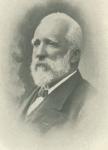The novels Halek (1881) and its sequel, Amoni (1904) tell the story of a young man, Halek (a Hebrew word meaning pilgrim), who after becoming inspired by his beloved, Turoni, undertakes a lifelong spiritual quest. The journey, which is completed by the end of the first book sees Halek's pilgrimage play out in variety of utopian and dystopian settings, taking him from 'a fictive world of greed and incivility (Pagam) to a land of moral aspiration and spiritual effort (Karom) and finally to a place of spiritual perfection (Sahitam)' (Buckridge and McKay, p.24). In his Preface to Almoni Nicholson provides a brief explanation of Pagam, Karom and Sahitam:
The island which is the scene of Halek's adventures is peopled by Pagmas, Karomas and Sahitamas. He that is wasting his substance in a far country is a Pagma; he that has arisen, and is on his way to the Father, is a Karoma; [and] he that has realised his oneness with the father, and dwells in the peace of love is a Sahitama (x).
Almoni, described by Nicholson as a 'companion volume,' deals with Halek's 'progressive initiation into "worshipful brethren" of spiritual adepts, his falling in love with the lovely Lirusan, and his return on a mission to Karom and Pagam. In By the Book: A Literary History of Queensland, Buckridge and McKay argue that while Nicholson claims that his intention was to "to write a work which would combine the most engaging qualities of Robinson Crusoe with those of The Arabian Nights," The Pilgrim's Progress is in some ways the more obvious model' (p. 24).
Buckridge and McKay further note that one of the more unusual features of both books 'is their preoccupation with the subject of poetry and "being a poet:"
Social life, even in the debased land of Pagam revolves around regular public performances, some of them fiercely competitive. Halek and his associates agonise about the technical virtuosity and emotional power of their own and others' poems, and Halek's retun journey to Pagam clearly symbolises the civilising mission of poetry to a culturally deprived colonial outpost... Halek's world embodies a kind of Augustian ideal in which poetry, music and the other arts all matter deeply and form the common staple of public recreation and discourse (25).

